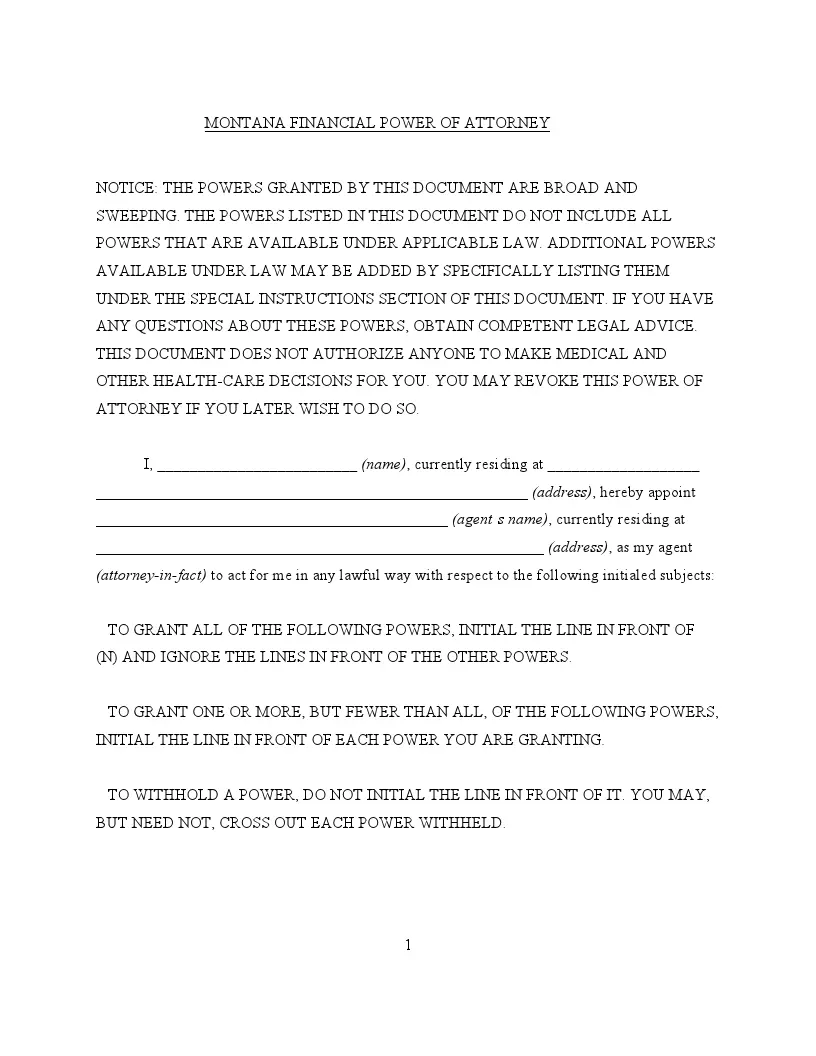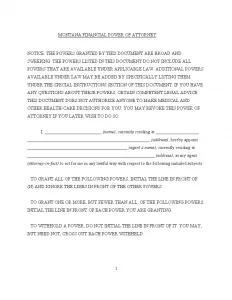Montana General Financial Power of Attorney Form
The Montana general financial power of attorney is a legal paper that permits an individual (referred to as the “principal”) to authorize another person (referred to as the “agent” or “attorney-in-fact”) to handle their financial matters. This power of attorney form can be extensive, allowing the agent to oversee various financial tasks like accessing bank accounts, purchasing or selling real estate, and managing investments, among other responsibilities.
The principal can revoke the general power of attorney whenever they are mentally capable. Besides revocation, this form ends when the principal dies, becomes incapacitated (unless specified as durable), or in the event of a divorce if the agent is the principal’s spouse. These conditions hold unless the document explicitly states otherwise. If you need a form to be effective upon your incapacity or want to grant a power to make health care decisions, use other Montana power of attorney templates.

Build Your Document
Answer a few simple questions to make your document in minutes
Save and Print
Save progress and finish on any device, download and print anytime
Sign and Use
Your valid, lawyer-approved document is ready
Montana Code Annotated — Title 72, Chapter 31, Part 3 (Uniform Power of Attorney Act) outlines the general power of attorney regulations. This legislation outlines the specific conditions under which an agent can act on behalf of the principal, particularly in sensitive financial matters.
For a power of attorney to be legally binding in Montana, it must be notarized at the time of signing, as per Section 72-31-305. Under Section 72-31-336, an agent has the authority to engage in specific actions only if these are explicitly mentioned in the power of attorney document:
- Create, amend, revoke, or terminate an inter vivos trust.
- Make a gift;
- Create or change rights of survivorship;
- Create or change a beneficiary designation;
- Delegate authority granted under the power of attorney;
- Waive the principal’s right to a survivor benefit under a retirement plan;
- Exercise fiduciary powers that the principal can delegate;
- Disclaim property, including a power of appointment.
Furthermore, according to Section 72-31-310, creating a new power of attorney does not automatically cancel a previous one. The new document must specifically state that it revokes the earlier one or all other powers of attorney for the previous ones to be invalid.
Montana General Power of Attorney Form Details
| Document Name | Montana General Power of Attorney Form |
| Other Name | Montana Financial Power of Attorney |
| Relevant Laws | Montana Code Annotated, Title 72, Chapter 31, Part 3 |
| Avg. Time to Fill Out | 10 minutes |
| # of Fillable Fields | 41 |
| Available Formats | Adobe PDF |
Filling Out Montana General (Financial) POA Form
The Montana general power of attorney can grant broad powers, so it is essential to fill it out correctly to ensure it reflects the principal’s wishes. Below are detailed, step-by-step instructions to help you complete this form.
1. Principal’s Information
Begin by entering the principal’s full name and current address at the top of the form. This information is crucial as it identifies the individual granting the agent the powers. Ensure that the name and address are accurate and up-to-date, as any errors could cause confusion or issues with the document’s validity.
2. Agent’s Information
Next, provide the full name and current address of the agent. The agent is the person who will act on behalf of the principal in managing their financial affairs. It is essential to select someone trustworthy and capable of handling financial responsibilities. Ensure the information entered here is correct to avoid misunderstandings or legal complications later.
3. Granting Powers
The form lists various powers that the principal can grant to the agent. To grant all options, initial the line in front of “All of the Powers Listed Above.” If the principal only wants to grant certain powers, they should initial the lines in front of each specific option they wish to grant.
4. Special Instructions
The principal can specify additional powers or limitations beyond those listed. This section provides flexibility to tailor the document to the principal’s needs. For example, the principal might include provisions for handling digital assets or specific instructions regarding certain financial transactions. Detailed and clear instructions in this section help ensure the agent understands the principal’s wishes.
5. Effective Date
You can make the document effective immediately by initialing the appropriate line. Alternatively, you specify when the POA will become effective. Initial the line corresponding to the chosen option. Choosing an effective date determines when the agent can begin to act on behalf of the principal.
6. Termination Date
There are several options: the POA can terminate when the principal signs a written revocation, on a specific future date, or when the principal becomes incapacitated. The principal should initial the line corresponding to their choice. Clearly defining the termination conditions helps avoid confusion and ensures that the agent’s authority ends appropriately.
7. Successor Agent
A successor agent can be named if the initially appointed agent cannot serve. Provide the full name and address of this alternate agent. It is a good idea to have a successor agent as a backup to ensure that someone is always available to act on behalf of the principal.
8. Principal’s Signature
It is important that the principal signs the document in the presence of a notary public or witnesses as required to meet legal requirements and ensure the document’s validity.
9. Notarization
For the document to be legally binding, it must be notarized. A notary public will verify the principal’s identity and witness their signature, then add an official seal to the document, confirming its authenticity.
